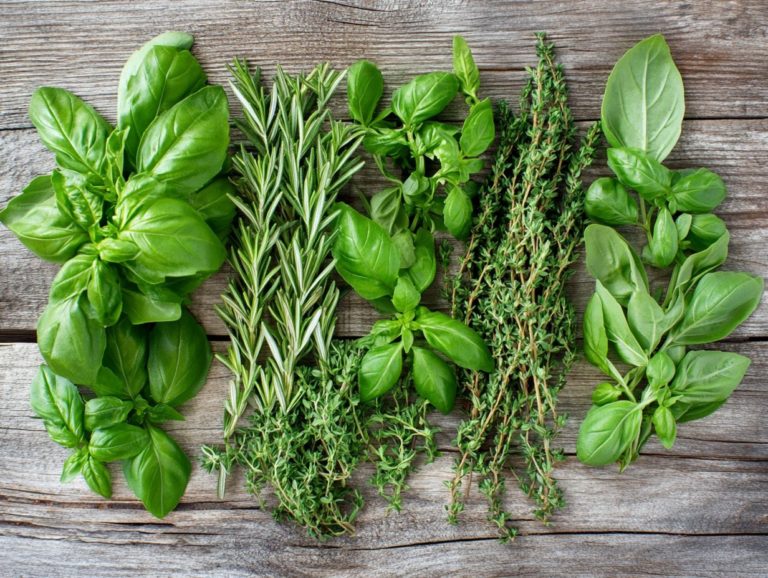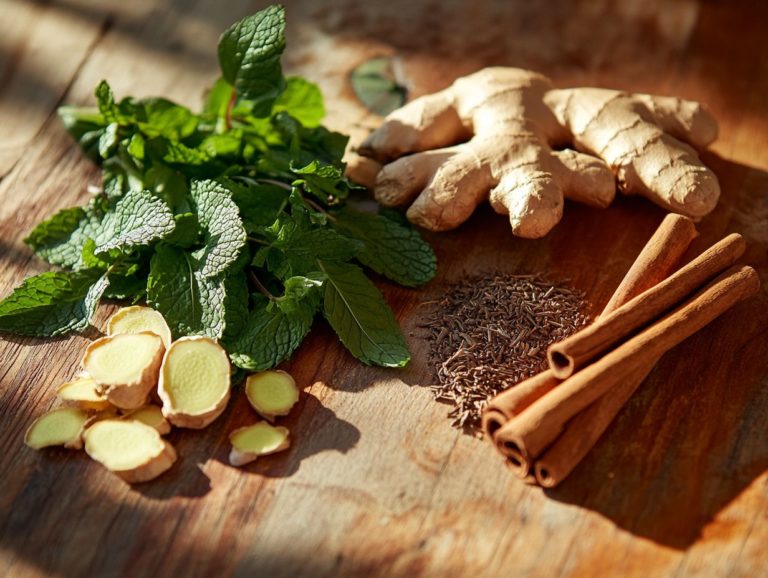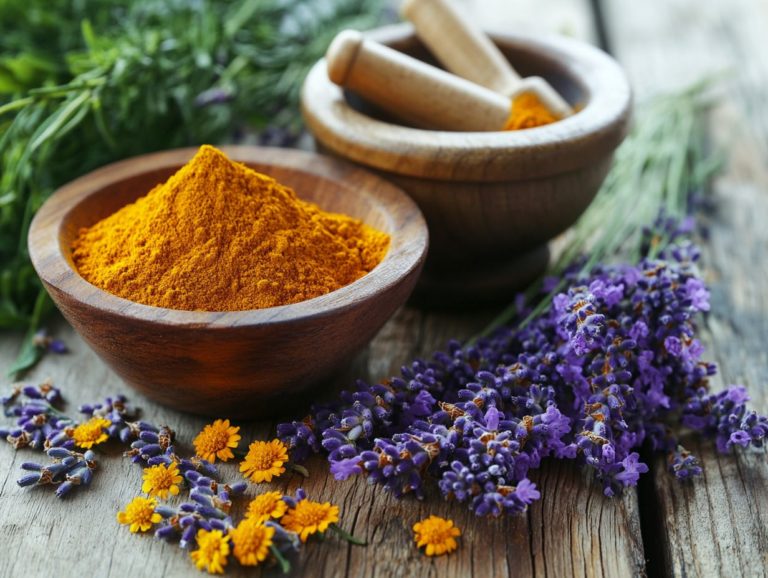5 Best Herbs for Digestive Health
Maintaining digestive health is vital for your overall well-being. Nature provides a wealth of remedies, including various medicinal herbs, to support this essential function.
Consider five powerful herbs ginger, peppermint, fennel, chamomile, and turmeric that can soothe your digestive system and help you achieve balance while also boosting gut health.
Get ready to discover amazing benefits that can transform your gut health! You ll learn how to incorporate these herbs into your daily routine, examine potential risks, and uncover alternative natural remedies.
Uncover how these remarkable herbs can elevate your digestive health to new heights!
Contents
Key Takeaways:
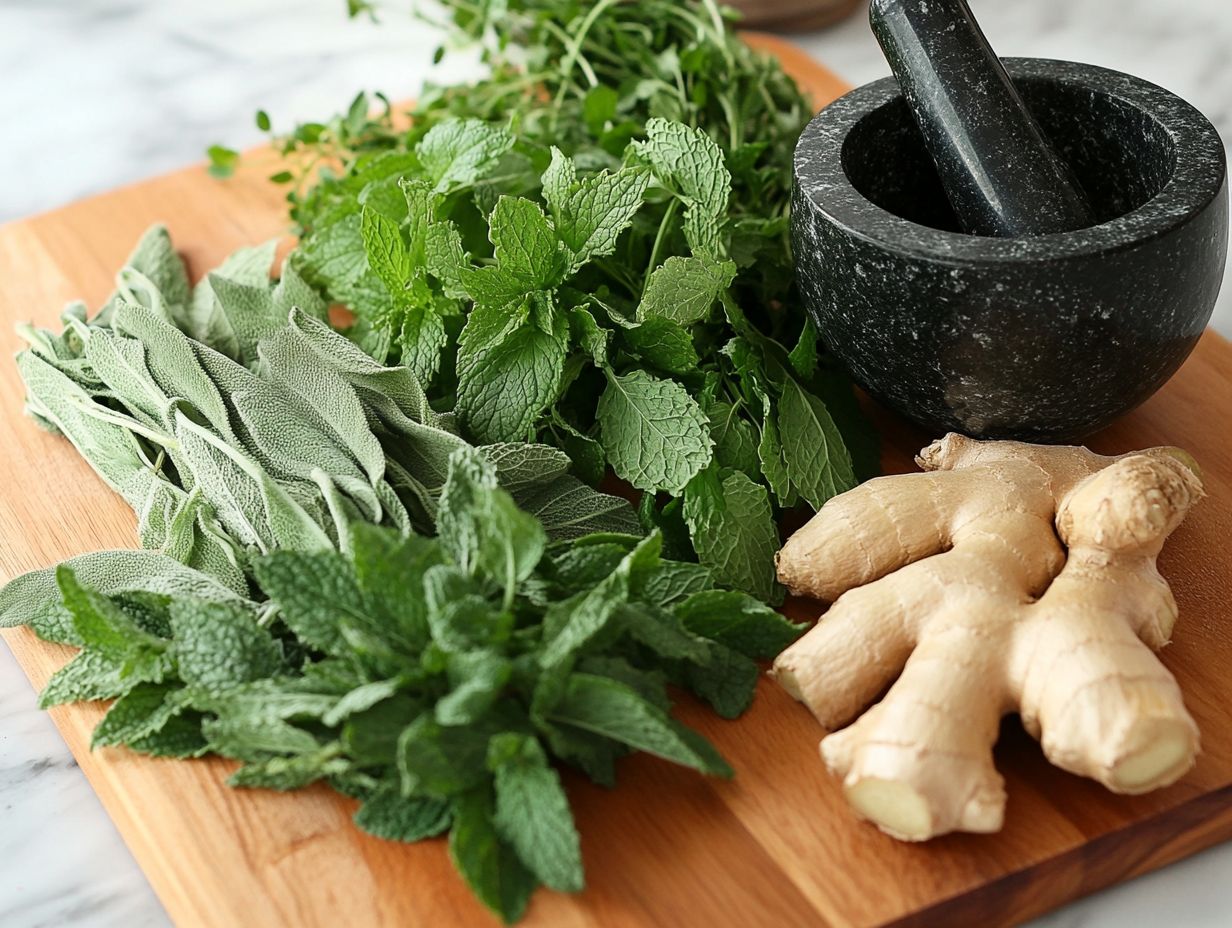
- Ginger can ease nausea, bloating, and gas, making it a top herb for digestive health.
- Peppermint helps relieve stomach discomfort and promotes healthy digestion.
- Fennel soothes digestive issues like cramps and indigestion.
- Chamomile has anti-inflammatory properties that can help with digestive problems like diarrhea and gas.
- Turmeric aids in digestion and can help reduce symptoms of irritable bowel syndrome (IBS), a common digestive disorder.
1. Ginger
Ginger, celebrated for its remarkable medicinal properties, is an exceptional herbal ally in promoting digestive health. It s an essential addition to your routine if you’re looking to enhance gut health and overall well-being.
Rich in anti-inflammatory compounds, ginger actively reduces gut inflammation, providing relief for those dealing with conditions like irritable bowel syndrome (IBS). This remarkable herb is one of the 5 must-try herbs for digestive health and nurtures a balanced microbiome that facilitates digestion and boosts nutrient absorption.
If you’re struggling with digestive discomfort, ginger can help alleviate symptoms such as bloating and cramping, creating a smoother overall digestive experience. Start adding ginger to your diet today for better digestive comfort!
2. Peppermint
Peppermint, with its refreshing aroma and calming properties, supports your digestive system and enhances gut health. This herb is a favorite among natural remedies.
For centuries, various cultures have harnessed peppermint’s benefits to alleviate bloating and indigestion. This aromatic oil soothes gastrointestinal distress and plays a vital role in strengthening the gut barrier function.
It also boosts digestive enzymes, which help break down food and absorb nutrients efficiently. By incorporating peppermint oil into your daily routine through teas, capsules, or topical applications you may find a natural ally in supporting your digestive health.
3. Fennel
Fennel, renowned for its aromatic seeds, offers exceptional digestive support. It effectively aids in nutrient absorption and promotes a balanced gut microbiome.
This versatile herb is found in traditional cuisines from Mediterranean fare to Indian remedies thanks to its unique flavor and health benefits. Notably, fennel is well-regarded for its ability to reduce bloating and gas, making it a go-to choice for anyone seeking relief from uncomfortable digestive issues.
Its antioxidant properties further enhance gut health by combating oxidative stress, potentially lowering the risk of chronic diseases linked to digestion. Incorporating fennel into your daily meals not only elevates flavor but also represents a proactive step toward achieving a healthier gut and overall well-being. For those seeking additional support, exploring 5 herbs for natural pain relief can also be beneficial.
4. Chamomile
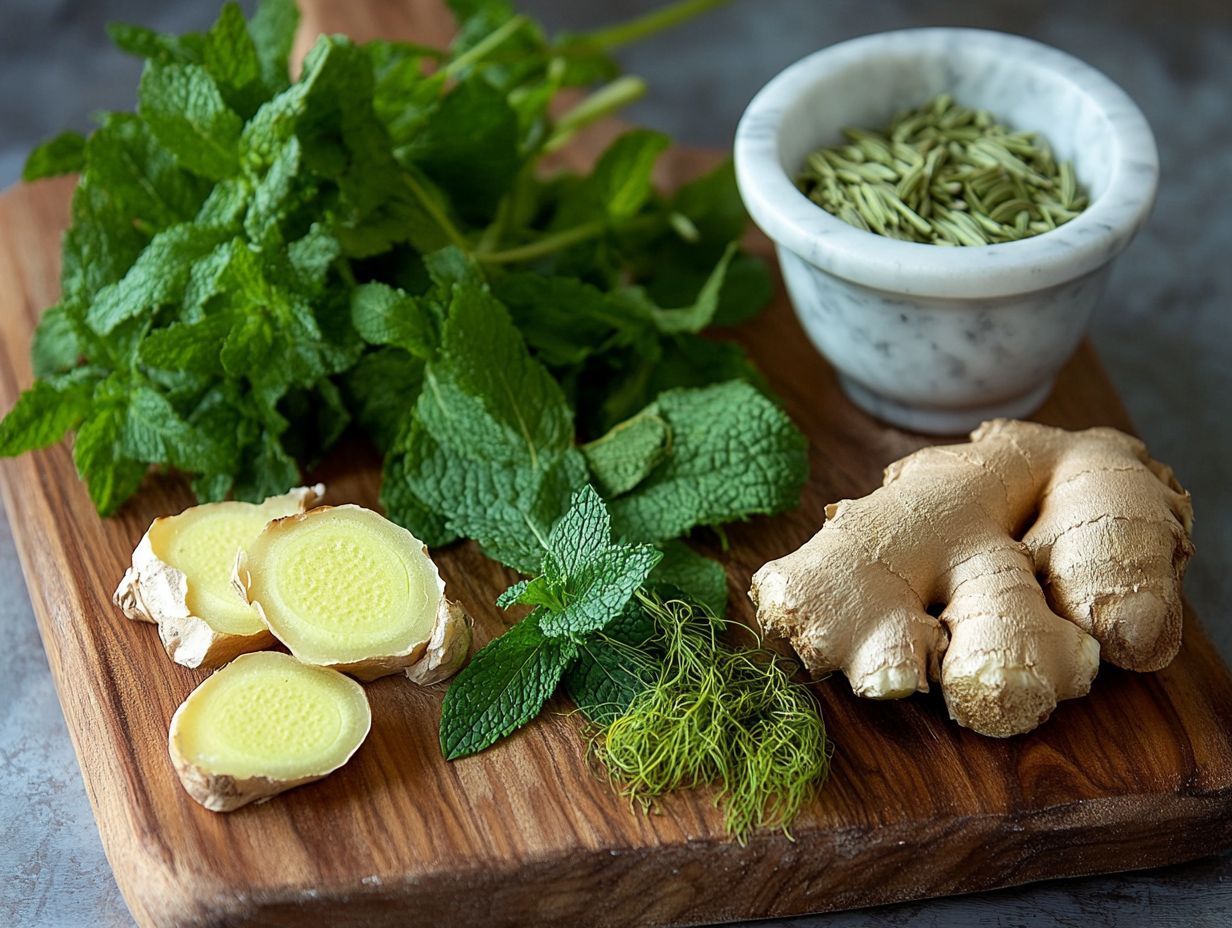
Chamomile is often savored as a soothing tea. It is highly regarded for its calming effects on the digestive system.
This beloved herb is celebrated not only for its gentle flavor but also for its remarkable anti-inflammatory properties. By reducing inflammation in the gut, chamomile offers relief from issues like bloating and cramping.
It provides essential comfort for those grappling with digestive discomfort and gastrointestinal health challenges. Its mild sedative effects can help lower stress levels, fostering a sense of relaxation that ultimately supports overall gut health.
When your mind is at ease, your body tends to follow, creating a harmonious balance that enhances both digestion and well-being.
5. Turmeric
Turmeric, with its vibrant yellow hue, is an essential herb if you’re looking to support digestive health and optimize digestive function. It also enhances the balance of your gut microbiome.
The magic of this remarkable spice lies in curcumin, the active compound that fights inflammation at a cellular level. Historically, curcumin has played a pivotal role in Ayurvedic medicine, valued not only for its flavor but also for its therapeutic benefits.
Incorporating turmeric into your daily diet is simple. You can add it to smoothies, soups, or even enjoy a soothing cup of golden milk. Understanding its profound effects helps you appreciate how this ancient herb remains relevant in modern health practices.
How Do These Herbs Help with Digestive Health?
These amazing herbs offer incredible benefits that can transform your digestive health. They provide essential support, enhance digestive function, and promote balanced gut flora, which is vital for your overall well-being.
Their anti-inflammatory properties work wonders, soothing your digestive tract and alleviating discomfort and irritation. This can improve symptoms of irritable bowel syndrome (IBS).
Some herbs have even been shown to enhance nutrient absorption, maximizing your body s ability to utilize essential vitamins and minerals.
Clinical research indicates that some of these herbs can effectively balance gut flora, ensuring a healthy microbiome that fosters optimal digestion. Studies published in the Journal of Gastroenterology highlight how specific herbs can diminish symptoms of irritable bowel syndrome and promote comprehensive gut health.
What Are the Other Benefits of These Herbs?
These herbs offer a plethora of other health advantages, including potent antioxidant effects that combat inflammation and help mitigate chronic diseases.
These herbs also boost your energy levels, making them an exceptional addition to your wellness routine. Often packed with essential vitamins and minerals, they provide nutrient-dense options that support your overall health.
Start adding these powerful herbs to your meals today for a healthier tomorrow! Incorporating them into your daily meals can significantly enhance your vitality, bolster your immunity, and promote a genuine sense of well-being.
By nourishing your body with these natural powerhouses, you not only nurture your digestive system but also lay a robust foundation for vibrant health and longevity.
How Can These Herbs Be Incorporated into One’s Diet?
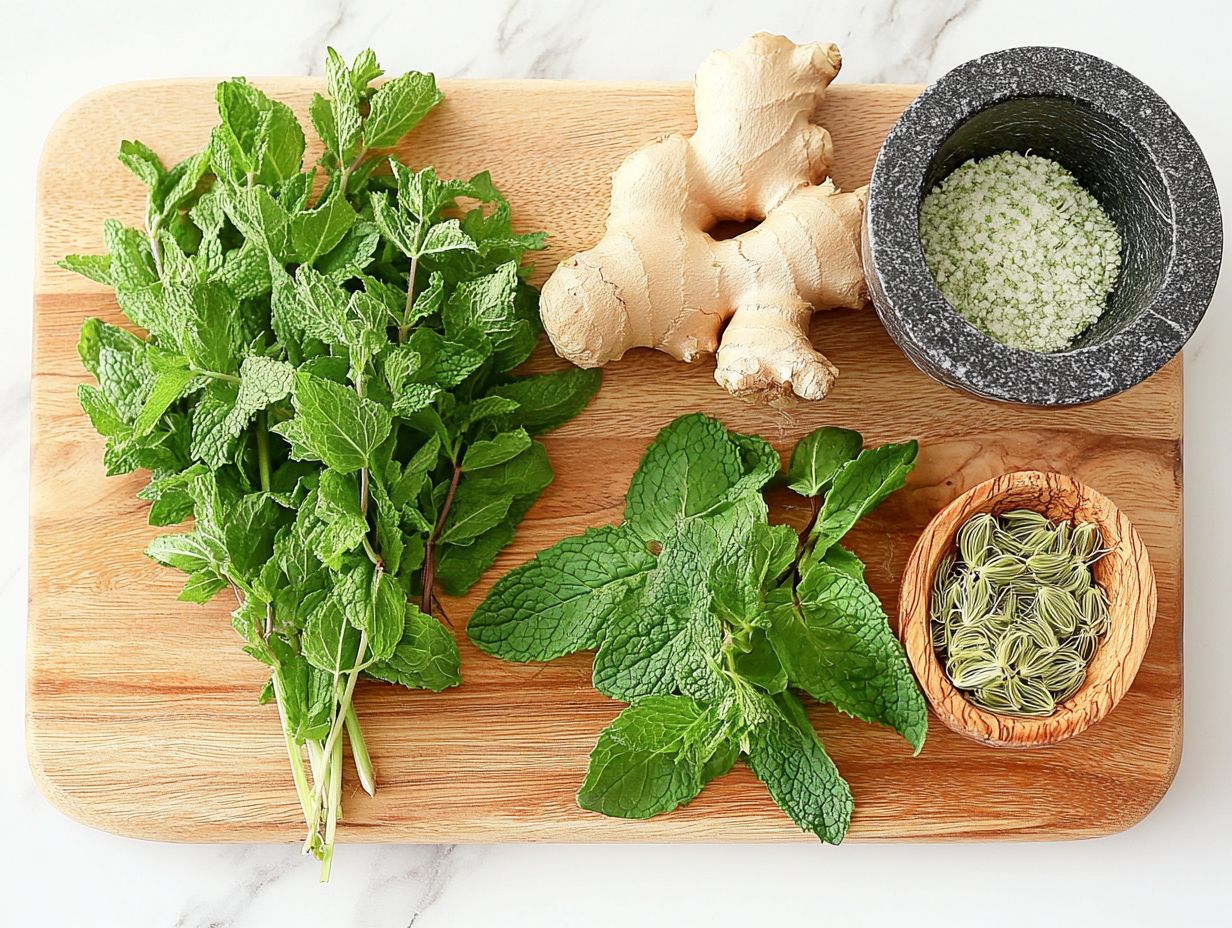
Adding these herbs to your diet is simple and rewarding. You can improve your cooking while benefiting your digestive health.
Use these herbs in your cooking to elevate your dish’s flavors. You’ll enjoy both great taste and health benefits. For example, adding fresh basil or cilantro to your salads brightens up the flavors and provides essential nutrients.
Brewing herbal teas, such as peppermint or ginger, serves as a soothing digestive aid after meals.
Sprinkling dried herbs like oregano or thyme over roasted veggies makes meals delicious and nutritious. Even in your smoothie recipes, just a dash of these herbs can enhance flavor and boost your health without overwhelming your palate.
Are There Any Risks or Side Effects of Using These Herbs?
While these herbs offer numerous health benefits, be mindful of potential risks or side effects, especially if you have specific health conditions.
Some herbs can cause stomach problems, trigger allergies, or negatively interact with your medications. This may reduce the effectiveness of either the herb or the medication. Always consult with a healthcare professional regarding your herbal choices, especially if you are pregnant, nursing, or managing chronic illnesses.
Insights from functional medicine stress the importance of evaluating your unique biochemistry and health history before introducing herbs into your routine. This personalized approach can reduce risks while amplifying benefits, ensuring your experience with herbal remedies is safe and effective.
What Are Some Other Natural Remedies for Digestive Problems?
Explore other natural remedies! You ll find a variety of natural solutions for digestive issues, ranging from dietary products to lifestyle adjustments that promote gastrointestinal health.
By making dietary changes, like boosting your fiber intake and enjoying more fermented foods, you can significantly enhance your gut flora. Probiotics, found in yogurt or as supplements, are essential for restoring balance in the digestive system.
When you combine various medicinal herbs with these dietary strategies, you can amplify their effectiveness. For example, pairing ginger s soothing properties with turmeric s anti-inflammatory benefits creates a powerful synergy that strengthens digestive health and promotes overall wellness.
Frequently Asked Questions
What are the 5 best herbs for digestive health?
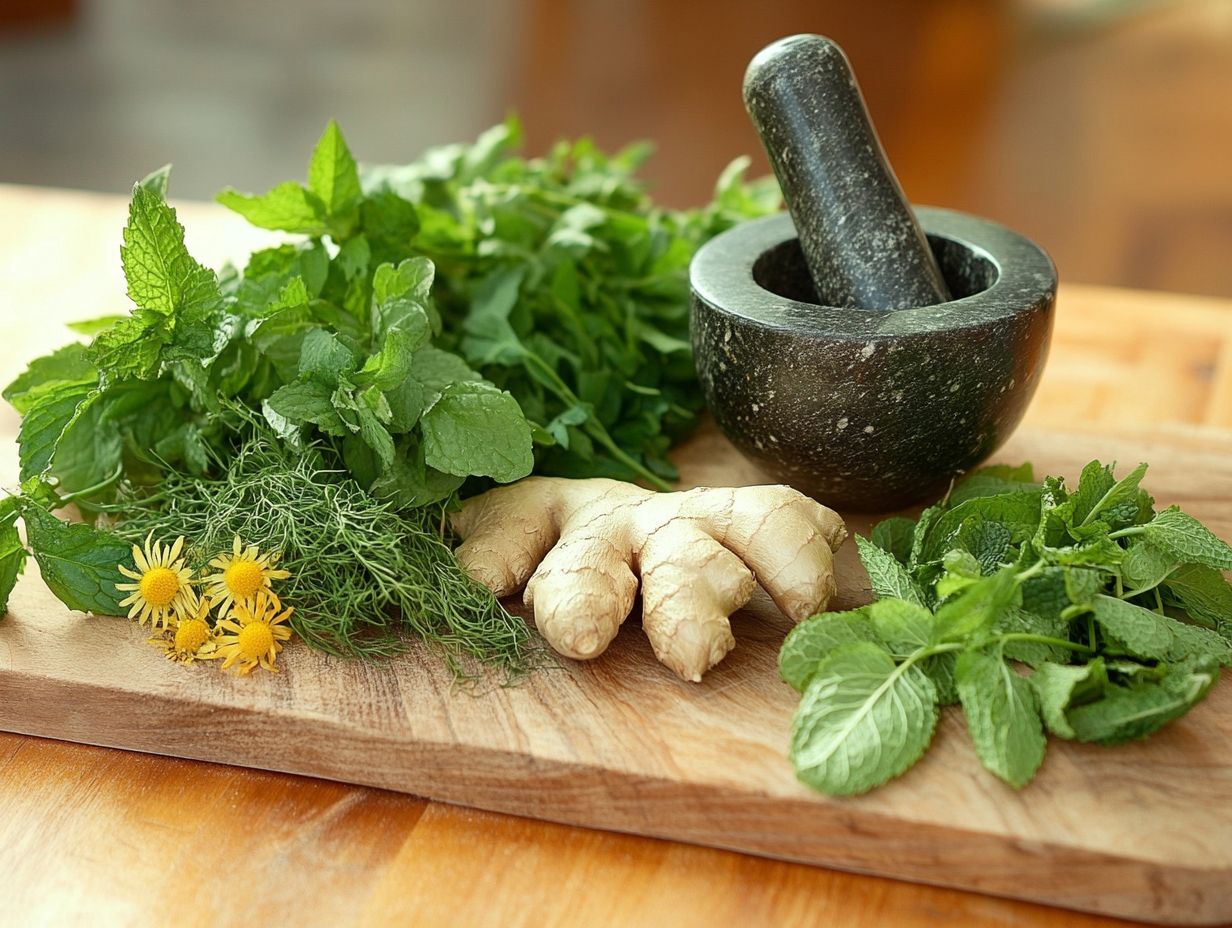
The 5 best herbs for digestive health are ginger, peppermint, fennel, chamomile, and turmeric.
How does ginger help with digestive health?
Ginger is known for its anti-inflammatory properties, which can reduce inflammation in the digestive system and alleviate symptoms of indigestion and bloating.
Can peppermint aid in digestion?
Yes, peppermint relaxes the muscles in the digestive tract, helping relieve gas and bloating. It also calms the stomach, making it useful for nausea and vomiting.
What makes fennel beneficial for digestive health?
Fennel contains anethole, a compound that helps reduce spasms in the digestive tract. It also has carminative properties, easing discomfort and promoting digestion.
How does chamomile promote digestive health?
Chamomile has anti-inflammatory and anti-spasmodic properties, alleviating symptoms of irritable bowel syndrome and other digestive issues. It relaxes the stomach and improves digestion.
Is turmeric effective for improving digestive health?
Absolutely! Turmeric can be a game-changer for your digestive health.
It contains curcumin, a natural substance found in turmeric, that reduces inflammation in the digestive system. Curcumin also has antioxidant properties that enhance overall digestion.



